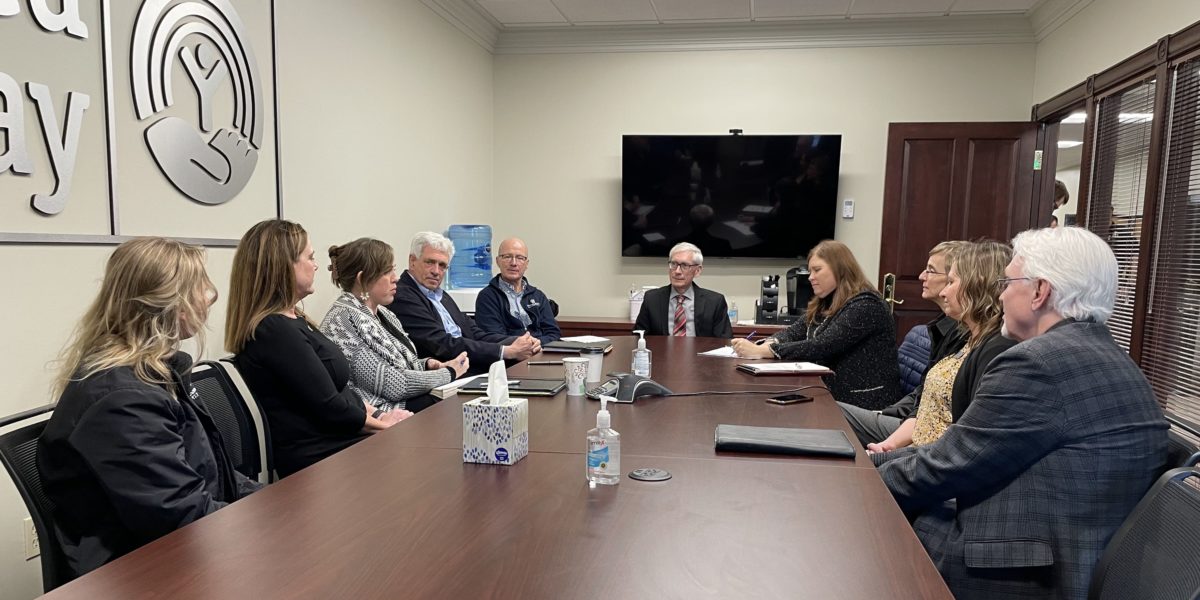Door County housing leaders suggested additional state funding and incentives for affordable housing in a roundtable Tuesday with Gov. Tony Evers, who was in Sturgeon Bay to promote initiatives in his 2023-25 budget proposal.
The governor’s proposed budget, which requires approval by the state Legislature, includes more than $500 million in statewide funding to support affordable housing through grant programs, loans and tax credits for municipalities and households.
The roundtable discussion was held at United Way of Door County and included leaders from United Way, the Door County Housing Partnership, the county government and the Door County Economic Development Corporation, as well as Coldwell Banker real estate agent Scott Bader and resident Paula Anschutz, who has worked to move and repurpose cabins from the Little Sister Resort property. Evers was accompanied by state Department of Administration Secretary Kathy Blumenfeld.
The local housing leaders discussed the need for up-front capital – as well as incentives for municipalities and developers – to help facilitate moving and repurposing existing houses. They also emphasized the need for more funding for organizations such as the Housing Partnership that use the community land trust model, as well as more flexibility in state funding for affordable housing so that it could be used to fund infrastructure such as water and sewer.
The local leaders and the governor also stressed the importance of housing and child care in economic development and attracting and retaining workers. The event provided an update to Evers on the $3.5 million grant the state awarded United Way in December 2021 for work on similar issues.
The grant has provided funding for construction of the new location of the Door Community Child Development Center in Sturgeon Bay; renovations at the Northern Door Children’s Center in Sister Bay; the Housing Partnership; Anschutz’s work; and half the salary of a new child care coordinator position at United Way.
Evers said he’s told Door County’s story all across the state. Child care and housing affect the state’s economy the most, he said, because of a shortage of workers.
“When I first came up here and heard the story about what you wanted to accomplish, it’s extraordinary,” Evers said. “And it’s happening.”
“The time is now,” he added, pointing to the state’s budget surplus.
Needs for up-front capital for moving, building homes
Much of the roundtable discussion focused on Anschutz’s work and that of the Housing Partnership. The Housing Partnership is a nonprofit organization working to build affordable homes, subsidize their purchase by working families and guarantee that the homes stay in the hands of working families throughout the life of the home.
Anschutz said she’s learned a lot through her work moving and repurposing cabins, and that the process needs to be smoother.
The challenges in that process include finding land that’s available and zoned correctly, as well as the up-front costs of moving and in some cases buying the houses, she said. Repurposing houses is a much cheaper way to create affordable housing than new construction, she said, but it also involves having to pay up-front costs more immediately.
“I’ve learned that local government is hard,” Anschutz said.
“In this case, everyone wanted to do the right thing,” she added, noting that the Village of Sister Bay could have sold the lots where the cabins will be moved at peak market value.
There also are issues with timing and getting permission to acquire and move buildings when a developer wants to tear them down to redevelop a property, Anschutz said.
Anschutz and Housing Partnership president Jim Honig said they had an opportunity to repurpose homes at the site of the former Malvetz Furniture and Floor Covering store in Sturgeon Bay, now a Kwik Trip location. They were unable to do so, they said, because they didn’t have enough up-front capital and because of issues with when they would have been allowed to move the homes.
Anschutz and Mariah Goode, the director of Land Use Services for the county government, suggested creating incentives for municipalities and developers to help facilitate re-purposing houses. Goode also suggested allowing funds from the Wisconsin Housing and Economic Development Authority (WHEDA) to be used for infrastructure such as water and sewer. Goode and Bader also are on the board of the Housing Partnership.
The community land trust model that the Housing Partnership uses to acquire or build affordable homes has proven to be a solid and cost-efficient way to invest public dollars, Honig said, citing similar organizations around the state and the country.
Creating a new affordable home requires a large subsidy up front, Honig said, but it’s cost efficient when considering the life of the home, during which a number of families might live there.
“If you amortize that (initial subsidy) over eight or 10 families, it doesn’t look like so much,” Honig said.
Proposals include grants to fund housing, infrastructure, child care
The affordable housing proposals in Evers’s budget include:
- $150 million in state funding to continue the Neighborhood Investment Fund grant program, which originally was funded by federal dollars from the American Rescue Plan, a 2021 Covid relief law. The program provides grants to local governments to support building affordable housing, increasing child care, improving transportation and other economic development projects.
- $150 million to establish an affordable workforce housing grant program, which would provide funding to municipal governments “to encourage the development and maintenance of additional affordable workforce housing in the state, including costs for infrastructure projects related to new residential developments, such as water, sidewalks, and sewer,” according to a press release from the governor’s office. Municipalities that alter their zoning to support affordable housing would receive an additional bonus.
- $100 million to create a municipal home rehabilitation program, which would provide grants to municipal governments to renovate and restore “blighted residential properties,” according to the press release.
- $100 million to revise and expand the Workforce Housing Rehabilitation Loan Program at WHEDA. “The revised program would provide low-interest and forgivable loans to low- to moderate-income households to renovate or repair their current home, including lead remediation,” according to the press release.
Other proposals would expand how tax incremental finance districts can be used to support affordable housing, create a rental assistance program for veterans, and modify a state housing tax credit to provide more funding and provide credits over more taxable years.
Evers said Tuesday he hopes the final legislation will not have too specific a definition of what counts as affordable housing, noting that what’s affordable in Door County isn’t the same as what’s affordable in Milwaukee.
Knock contacted state Rep. Joel Kitchens and state Sen. Andre Jacque to ask for their comments on the proposals in Evers’s budget.
Jacque said workforce housing is a critical issue for Door County.
“As a member of the Wisconsin Council on Workforce Investment, I look forward to hearing updates on this initiative and opportunities to further participate in the discussion on workforce housing,” Jacque said in an emailed statement provided by his office. “This is a critical issue for our entire state and especially Door County, as I have emphasized in my legislative proposals and past work as chair of the Senate Workforce Development Committee and (WHEDA) Board Member. In my comments this morning to the United Way’s statewide advocacy day participants, it was great to help draw connections between workforce demands and the need to expand childcare capacity and produce more affordable homes to attract the skilled working professionals the Door County economy needs to support our community, create jobs and grow the local tax base to remain growing and vibrant.”
Kitchens said he could not comment on the governor’s appearance in Sturgeon Bay because he had not been notified of it until Tuesday morning. He did not respond to a request for comment on the proposed initiatives themselves.

